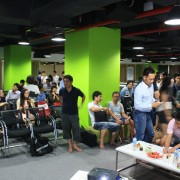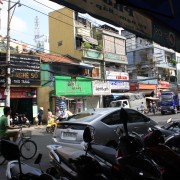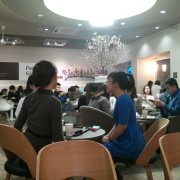Startup Weekend Hanoi 2014
- The audience on Friday night.
- The welcome banner as participants headed into Hub.IT.
- The ideas on the wall.
- Track A winners from Friday.
- Track B winners from Friday.
- View from the audience.
- Brainstorming on the second day.
- Working a mentor.
- In a group session.
- Receiving certificates from the judges.
- Before the presentations on the third day.
- The audience on the third day.
- Fit n’Grit team.
- The judging panel.
- Thanking the judges.
- Occupy Buildings Project.
- OIC team presenting their app.
- OIC Team with mentor.
- Olymsearch’s presentation.
- OnTot Tutoring service.
- The winning team.
- VnSpace.vn’s interior design service.
- Ideas on the whiteboard.
- Teams being congratulated.
It started off with 220 online applications and eventually organizers selected 70 people to participate in the Startup Weekend Hanoi held at Hub.IT from August 29 until August 31.
While there were no specific themes to adhere to, participants entered one of two tracks: Track A, which included pre-formed teams of three-to-five people and Track B, which consisted of pitch ideas from individuals who could be joined by others to form a team if his/her idea was was approved by the audience.
Startup Weekend was created in Vietnam in Ho Chi Minh City in 2011 and then expanded to Hanoi in 2013. This year the organization aims to open two chapters: one in Da Nang in central Vietnam, and another in Can Tho, in the Mekong Delta. Last month, the event was held for the second time this year at Hub.IT.
Hai Nguyen, an organizer of the Startup Weekends in Vietnam, shared with us that the aim of the events is not only to nurture and foster innovation and entrepreneurship in Vietnam but to also promote the empowerment of Vietnam’s strength sector, e.g., agriculture, through technology.
The opening session of the Startup Weekend started on Friday at 6:30 PM and lasted until about 8:30 PM. Each participant had one minute to convince the audience that his/her presented idea should be one of the final group selected by popular vote (with Facebook “Thumbs-up” stickers placed on the most-liked written ideas hanging on the wall).
Among the various ideas presented during the initial round but were ultimately not selected by the audience included a mobile payment app, an online ticket website, and a way to repurpose unsold flowers for tea and medicinal uses. One of several recurring themes throughout Friday night seemed to revolve around vegetables and student buffets. And there was even a pitch for an online social network specifically for those born in the 1990s—perhaps a clarion call to start a new social network every 10 years? In all, about 30 ideas were shared but only seven made the cut for each track.
Newly formed and established teams returned the next day to Hub.IT from 9:00 AM until about 7:00 PM where they met with seven mentors to hash out their concepts and to prepare their final pitches for Sunday, the last day of the event. Finally, during Sunday evening each qualifying team had four minutes to present their concept, followed by a four minute Q&A session led by the four-member judging panel.
The Final Teams Presenting
First up was Team BB, which presented a compelling story time application. The team had developed a story creation landscape so that users can create stories with their family or friends. Afterward, a user can record his/her voice which is then overlaid on the story timeline. There are some quite exciting potential case uses for this technology. For example, parents can use the app to connect with their children even if they are on the road or away from home or a group of friends can get together to create a story during a reunion.
Next up was OnTot, an online tutoring service that creates a marketplace for students and potential tutors. When asked by a judge if the model was scalable, the team leader responded that he believed it could be used in the region in a country like Thailand or the Philippines. While parents may be interested in using an online tutoring service for their children, it’s unclear if students, especially younger children, will use such a service effectively. The team leader did point out that the team can launch the service in a month (although it wasn’t clear if it would be a funded or bootstrapped version) so it will be interesting to see what happens next for OnTot.
The next team presented marketing solutions software for small and medium businesses (SMB), called Beeketing. In short, the software automates the marketing process and suggests a range of tactics for a business owner to implement. It definitely could help some nascent online businesses to get the word out about their products or services or to help differentiate them from competitors. A judge asked how the service would retain customers as their knowledge of marketing improved and proposed tiers like Beeketing 1.0, 2.0, etc. to effectively approach consumers on their marketing knowledge platforms. This tiered servicing makes sense for Beeketing to meet the different needs of its customers.
One traditional concept that was presented was part-pastry shop and part-dessert distributor, Hy Hy Kitchen, named after the creator. It’s basically a handmade treats online kitchen with (at least) a single brick-and-mortar aspired location. Based on the four judges reactions, it was clear that they admired Hy Hy’s enthusiasm and gumption for her concept of “any dessert, all delivery.” Ms. Hy Hy explained the nomenclature behind her concept and told the audience that she wanted people to order Tiramisu, and to associate it with “forget me not.” We certainly won’t forget the delicious-looking photos you showed of your products.
Next up was Olymsearch, which is currently in Alpha stage of development. It was one of the few working products that were presented at the Startup Weekend Hanoi 2014 and it positioned itself as the go-to service for a personalized shopping experience. According to the Olymsearch team, the online platform is a combination of Google, Facebook, and E-Commerce all mashed up into one. The difference here is that Olymsearch is looking to fill the local e-commerce needs of Vietnamese.
AnGiNgon is a listing site for food, and is also geo-location based. Imagine checking the app to see what food options are nearby when you step out to lunch. Perhaps it is loosely based on Yelp, but what problem is the app solving? And for whom? The majority of Vietnamese consumers are extremely preferential and rely heavily on family and friends for a variety of suggestions on where to go to eat, drink, and shop.
Team OIC presented an indoor mapping solution—a service that could be offered at a mega mall like Vincom’s Royal City. The service would be able to direct users to stores that they are interested in and also provide information about on-going promotions at various retailers. The team was one of the few that utilized the dual presentation screens. The promotion portion sounds great but unless they are exclusive promotions for the app users then it may be hard for the app to gain traction.
VNspace.vn is a way to help homeowners design the interior of their homes. It’s definitely geared toward modern and trendy Vietnamese since a large component of Vietnamese decor is how ornate, or big, or traditional an item can be—usually sourced locally. VNspace.vn looks to partner with name brands in order to promote and offer their products. As Vietnam continues to modernize perhaps VNspace.vn or a similar service can fill a growing need. The site is currently in a closed beta.
Occupy Buildings Project—no, not a political movement but rather a system for utilizing rooftops to grow vegetables and other leafy greens. The team even had an irrigation demonstration to show the judges how the watering system would work. One possible way to monetize the idea was to share some of the revenue with the building owners from the sale of vegetables or whatever greens that were harvested on the roof. As one judge rightly pointed out, it is a vision of the future, perhaps 20 years ahead of its time. It’s definitely a long-term project but it could substantially transform the way ecology and business is viewed in Vietnam.
VipiOne is a negotiation service that acts on behalf of those seeking to buy a residence in Vietnam. However, it’s not clear why someone would use the service instead of negotiating him/herself. It’s also not clear why a potential homebuyer would trust the young founders to carry out the transaction.
Last but not least was Fit n’Grit, a personal trainer app. The two concept creators are currently offering personalized fitness tracking—and already have clients. The pair of friends are fitness enthusiasts who are in their last year of university where they are studying accounting and finance. The kernel of the idea is good and there’s definitely a need for proper fitness training and nutrition education—too often gym-goers are seen cranking out sloppy rapid-fire repetitions to the beat of the Vinahouse music.
Yes, there are personal trainers available in some gyms but at western prices and one-to-one personal sessions don’t scale well. We suggest that the Fit n’Grit team start by providing value on social media to create an online community ready to try out their app whenever it may be ready. Another approach could be to partner with independent gyms to provide an introductory training session (and share fees with the gym) and at the same time the team could collect contact and demographic information.
The Winners and Looking Forward
OIC and BB team emerged as the winners when the judges’ scores were finally tallied. The winners of Hanoi’s Startup Weekend event will head to Saigon to participate in Demo Day organized by StartUp.vn and Business Startup Support Center on September 12. The winners of the DemoDay will head to Seoul, ROK, where $100,000 will be on the line at the Startup Nations Summit 2014 from November 23-25.
Bobby Liu, judge and founder of Hub.IT, where the event was held, felt that this time around had a lot more solid ideas from startups and the split into two divisions was fair to the participants. On behalf of Hub.IT, Mr. Liu stated, “we’re obviously glad that we could support such a significant initiative and look forward to doing more.”
There are definitely some exciting times ahead as the BB and OIC teams represent Hanoi at Demo Day Saigon. It was also great to see the variety of the initial ideas presented to the audiences during the Friday night portion of Startup Weekend Hanoi. For some ideas, the matter is a question of timing. For others, it’s a matter of finding suitable ways to execute the idea. And for another segment of ideas, they just need some time and love to either develop or discard. No one has a monopoly on good ideas—and with the support system and effective platforms in place in the startup communities of Vietnam, the ideas coming from entrepreneurs, coders, and young Vietnamese can be turned into sustainable and scalable business models.

































